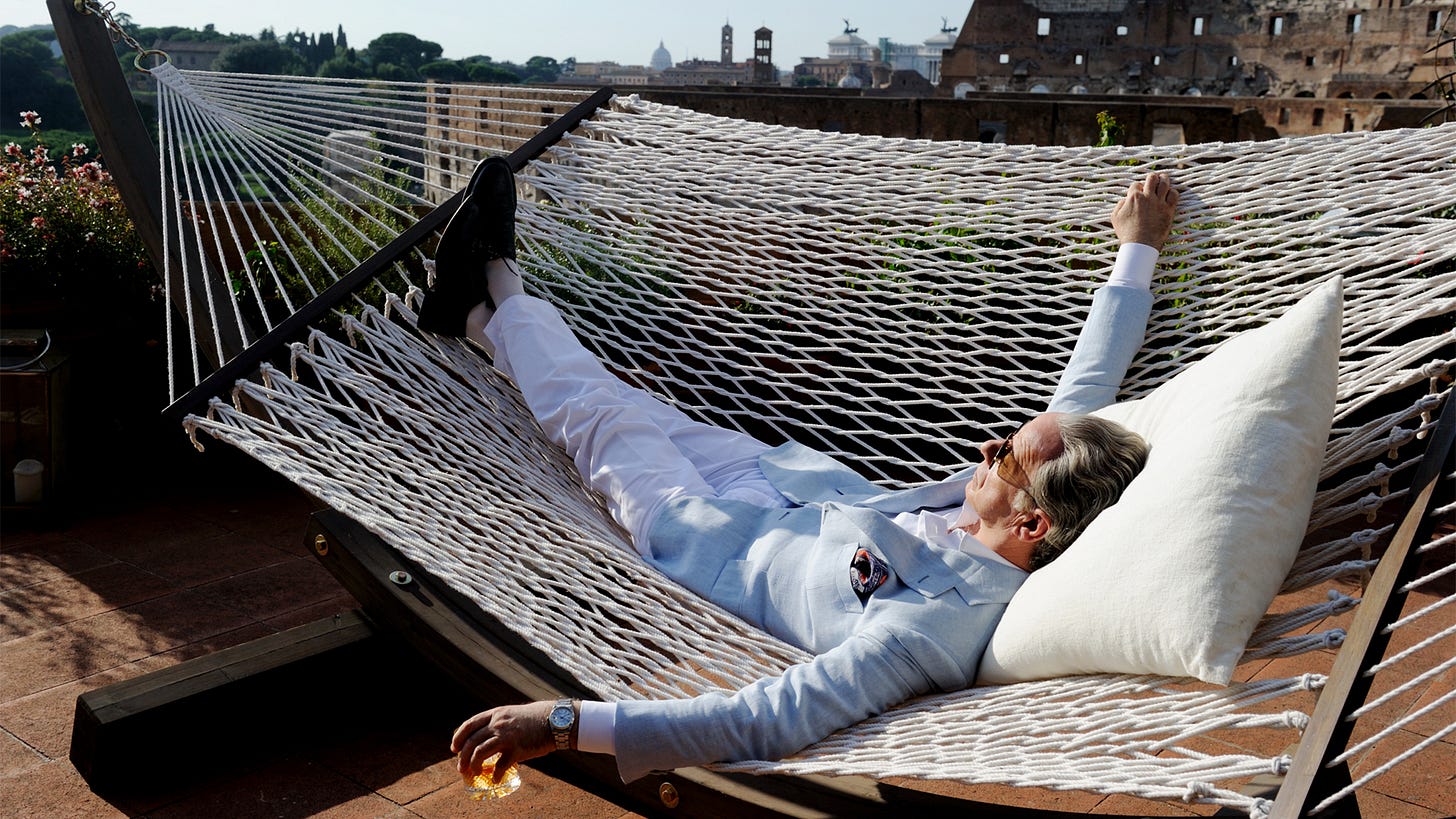It begins in a sea of Armani suits and Gucci dresses, on a rooftop in Rome. The camera jostles its way through the crowd almost apologetically and comes to rest on the back of Jep Gambardella. He turns, exhaling his cigarette smoke. ‘Happy Birthday Jep! Happy Birthday Rome!’, a woman shouts.

This is how Paulo Sorrentino’s La Grande Bellezza (The Great Beauty) begins. Actually, I tell a lie, there’s a brief prelude to this where a tourist collapses of a heart attack and a quote from Louis-Ferdinand Céline's Journey to the End of the Night:
Travel is useful; it exercises the imagination. All the rest is disappointment and fatigue. Our journey is entirely imaginary. That is its strength. It goes from life to death. People, animals, cities, things – all are imagined. It's a novel, just a fictitious narrative.
The film proper begins with Jep Gambardella (played by Toni Servillo) in a mass of dancers at his birthday party. The first thing we notice is that he is incredibly stylish – dressed in a perfectly tailored black suit that calls back to Marcello Mastroianni. The second thing we notice, is that he’s bored. The party is a formality to him, something to be patiently waited out. As he says later in the film, ‘I became king of the high-life’. From any other character these words would sound vain but from Jep it all sounds like an accident. It’s not what he wants and it's not something he’s tried to engineer. He’s plainly stating a fact. A fact which is clearly a disappointment to him. We see that no matter how stylish it is, this is not the life Jep wants for himself.
The Great Beauty is about writer’s block, but in reverse. Jep isn’t struggling to think of his masterpiece, he’s already written it. This book, called The Human Apparatus, is treated as genius by all the characters in the film. The question of the film becomes: if you’ve already produced your life’s work - or at least the work of a lifetime – what’s there left to do? In a sense, Sorrentino has made a film that is the opposite of his great hero Fellini’s 8 ½ . While Guido can’t decide what he wants to make and finds himself caught in a frenzied panic, Jep has already made it and finds himself in a state somewhere between completion and depression.
The great existential question is: what is my purpose? Jep has gone beyond this, he’s fulfilled it and now faces something far more existentially terrifying: living in the shadow of its completion. And so what is there left for him to do except drift from party to party and walk trance-like through Rome?
Of course, Rome is the perfect city for this feeling. Where else in the world is someone more reminded of the calcifying effects of achievement? Walk through Rome and you will pass countless sculptures of ‘greats’, all immobile and fading in the sun, all not quite human. There are few other cities where one is so constantly reminded of our smallness in the face of the enormity of history. Jep knows that he will fade into all this majesty. Maybe that’s a wonderful thing but the waiting for immortality must be torture.
It’s all so stylish though - the costumes regularly appear in Vogue. It’s easy to idolize Jep’s life – to look at his apartment covered in books overlooking the Coliseum; and his suits; and his wealth; and to mistake it for happiness. Sorrentino carefully lays this trap for us, Jep’s misery isn’t frenetic or self-destructive, instead it hides under a layers of ease. Beneath sprezzatura – studied carelessness.
One of the most famous scenes in the film comes when Jep is helping a friend choose a dress for a funeral. They are in a cavernous shop with marble floors and three beautifully made black dresses hanging on the wall[1]. Jep talks about the etiquette for a funeral, how it is both a performance and an honest outpouring of grief; both a messy and manicured event. He advises that you must:
whisper something to them, a comforting phrase, said with authority. For example: ‘in the days to come when you feel the void, I want you to know you can always count on me.’
He continues,
You’re allowed to retire to a corner by yourself, as if contemplating your sorrow.
Perhaps this is what he is doing. Jep Gambardella is a man who feels the void and who has nothing left to do but to contemplate his own sorrow.
We often think about great creative achievements as a way to achieve immortality. ‘I will live forever through my work’, becomes the battle-cry of some writers. Sorrentino accepts this and asks, what do you do while you are still alive but have achieved this immorality? If you put your life and soul into something, to live forever through it, what is left of you? This question is made more brutal by the audiences certainty that Jep can comprehend all this. ‘Strange. I feel strange’, he keeps repeating.
Jep is a man cursed by knowing the first line of his obituary: ‘Jep Gambardella, writer of The Human Apparatus …’ Sorrentino’s joke is we never find out what the book is about. It takes on a mythical status as does its writer.
Sorrentino’s film is beautiful. It manages to bury behind layers of style and charm something deeply tragic. It is the portrait of a man who has given his readers everything and is left with only disappointment and fatigue.
[1] I think 90s Prada but my eye for fashion isn’t very accurate. I know that Sorrentino has a long friendship with Miuccia Prada, so it would make sense.



